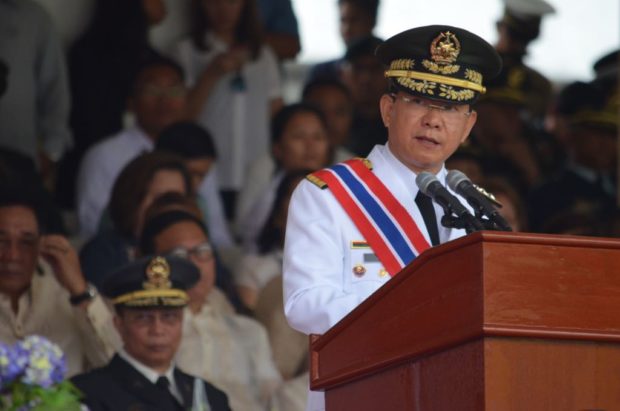Año vows to fix police image

Eduardo Año. NOY MORCOSO/INQUIRER.net
A day after President Rodrigo Duterte appointed him officer in charge of the Department of the Interior and Local Government (DILG), Eduardo Año said he would work to improve the antidrug campaign and the image of the Philippine National Police.
“It is embarrassing to the President. He has strongly supported the police, but even he is finding it hard to defend officers who are engaged in shenanigans,” Año said on Saturday in an interview with Presidential Communications Secretary Martin Andanar on the state-run Radyo ng Bayan.
The DILG has supervision over the PNP.
Año said improving the image of the PNP would be a lengthy process and would need a study of how a culture of abuse had developed within the ranks, even though crooked officers made up only a small fraction of the entire police force.
‘Commitment of the PNP’
Article continues after this advertisement“I have secured the commitment of the PNP leadership that we would start with the basics and see to it that the PNP would be an institution that is respected and loved by the people,” he said.
Article continues after this advertisementOne way of dealing with abusive officers is to impose severe punishments on those involved in irregularities, he said.
He warned officers linked to the drug trade to reform and help the government fight the menace or face life behind bars.
Last October, Mr. Duterte designated the Philippine Drug Enforcement Agency (PDEA) as the sole agency tasked to carry out the administration’s war on drugs in accordance with the Comprehensive Dangerous Drugs Act.
It was the second time he had removed the PNP from taking the lead role in the antidrug campaign after law enforcers’ involvement in questionable killings.
The thousands of drug-related deaths have given rise to allegations of extrajudicial killings and to criticisms of the President and his administration by human rights groups and other local and international organizations.
Mr. Duterte first stopped the police from conducting antidrug operations in January 2017 after it was found that narcotics officers had killed a Korean businessman they had kidnapped in the guise of an antidrug operation.
In December, the President ordered the PNP to actively support the PDEA.
Año said the police this time would use body cameras and he specified that only designated units would be allowed to join antidrug operations.
All the operations would be led by officers and everyone, up to the regional director, would be held accountable for whatever happens, he said.
“This is for us to ensure that no abuses will take place,” he said.
Año also said he had directed the PNP to focus on battling illegal gambling in cooperation with the Philippine Charity Sweepstakes Office (PCSO).
Intensify intelligence
The PNP and the PCSO would intensify their intelligence operations to identify illegal gambling operators and their protectors in government, he said.
Año also said he planned to strengthen the Bureau of Fire Protection (BFP), another agency under the DILG, and improve the capabilities of its officers.
He said the President had approved a P1-billion fund to purchase new equipment for the BFP to help it perform on par with world-class firefighters.
Defense Secretary Delfin Lorenzana on Saturday expressed full confidence in Año, who was appointed DILG undersecretary by Mr. Duterte on Oct. 26, the same day he retired as chief of staff of the Armed Forces of the Philippines.
“I am sure that with his dedication to duty, professionalism and experience in the military he will succeed as the head of [the] DILG,” Lorenzana said.